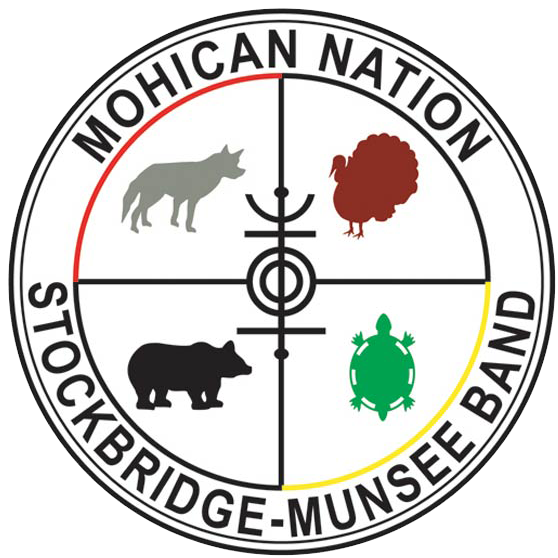Tribal Statistics
-
17 and under = 139
- Ages 18 - 65 = 1,181
- 64 and older = 253
-
16,255 are held in trust
- 5,884 are fee land
- 529 tribal members live on reservation, trust, or fee land along with 400 non-tribal members
The Stockbridge-Munsee Tribe employs 740 people and is the largest employer in Shawano County.
Tribal Government
-
A president
- Two year term
- Vice-president
- One year term
- Secretary
- An appointed position
- Treasurer
- Two year term
- Four council members
- The council meets twice monthly
- Decisions are made by a majority rule
- One year terns.
Elections are held in October every year.
Brief History
The Stockbridge-Munsee Band of Mohican Indians is descended from a group of Mohicans (variously known as Mahikan, Housatonic and River Indians; the ancestral name Muh-he-con-ne-ok means “people of the waters that are never still”) and a band of the Delaware Indians known as the Munsee. The Mohicans and the Delaware, closely related in customs and traditions, originally inhabited large portions of what is now the northeastern United States. In 1734, a small group of Mohicans established a village near Stockbridge, Massachusetts, where they began to assimilate but were nonetheless driven out by Euro-Americans. In 1785 they founded “New Stockbridge” in upper New York State at the invitation of the Oneida Indians. Their new home, however, was on timber land sought after by non-Indian settlers.
In 1818, the band settled briefly in White River, Indiana, only to be again relocated. In order to relocate both the Stockbridge-Munsee and Oneida Indians, government officials, along with missionaries, negotiated the acquisition of a large tract in what is now Wisconsin. In 1834, the Stockbridge Indians settled there; two years later they were joined by some Munsee families who were migrating west from Canada and who decided to remain with the Stockbridge families. Together, they became known as the Stockbridge-Munsee Band. The tribe expanded its land base by obtaining 46,000 acres by treaty with their neighbors to the north, the Menominee Tribe. More pressure from the government resulted in more relocation - first in Kaukana, Wisconsin, and later to a community on the shores of Lake Winnebago that the tribe named Stockbridge.
By the terms of a new treaty with the federal government in 1856, the band moved to its present site in Shawano County. The General Allotment Act of 1887 resulted in the loss of a great deal of land by the Stockbridge-Munsee. In the Great Depression, the tribe lost yet more land. However, in the early 1930’s the Stockbridge-Munsee experienced a reawakening of their identity and began reorganizing. In 1932 they even took over the town council of Red Springs under the provisions of the Indian Reorganization Act of 1934, created an activist Business Committee and started to regain some of their land. The Secretary of the Interior affirmed the reservation in 1937.
Tribal Services
-
Cross-deputized with the Shawano County Sheriff’s Department
- Funded primarily with federal funds, tribal funds, and contributions from the villages of Bowler and Gresham and funds from the Wisconsin Office of Justice Assistance
- Court System
- The Stockbridge-Munsee court system handles civil cases, domestic dispute and guardianship cases
- Tribally-funded
- Bowler School District (183 students/37.5% of the student body), 71% of Stockbridge-Munsee students graduated in 2004
- Shawano Gresham School District (463 Menominee & Mohican students/15.7% of the student body)
(Source: Wisconsin Department of Public Instruction)
In higher education, six Stockbridge-Munsee tribal members received undergraduate degrees in 2004. There are currently 85 tribal members seeking post-secondary degrees.
-
Tribally-operated clinic services include: ambulatory outpatient, medical, laboratory, radiology, pharmacy, dental, Alcohol and Other Drug Abuse (AODA) programs, mental health, community health, Indian Child Welfare Act programs, chiropractic, physical therapy and podiatry
- Funded by Stockbridge-Munsee, with some funds coming from the U.S. Indian Health Service and the Wisconsin Department of Health and Family Services
- Approximately 30% of those served are non-tribal members
-
After school program funding, including youth prevention (Alcohol and Other Drug Abuse programs, HIV/AIDS, suicide prevention, leadership skills building, independent living skills and open room activities) funded through tribal youth grant funds and the Wisconsin Department of Health and Family Services
- Domestic violence counseling/legal advocacy programs
- Homeless emergency shelter
- AODA counseling
- Child care assistance programs
- Nutrition programs
- Programs funded through tribal, state and federal monies
- Non-tribal members may take advantage of tribal social service programs, approximately 50% of those served are, in fact, non-tribal members
Economic Enterprises
Stockbridge-Munsee employs approximately 740 people
| Business |
Type of Business
|
|
Mohican North Star Casino and Bingo
Bowler, WI
|
Gaming/entertainment facility |
|
Many Trails Banquet Hall
Gresham, WI
|
Dining/entertainment facility
|
|
Pine Hills Golf Course and Supper Club
Gresham, WI
|
Recreation/dining facility
|
|
Little Star Convenience Store
Bowler, WI
|
Gasoline/light grocery
|
|
Mohican RV Park
Bowler, WI
|
Recreational vehicle compground
|
